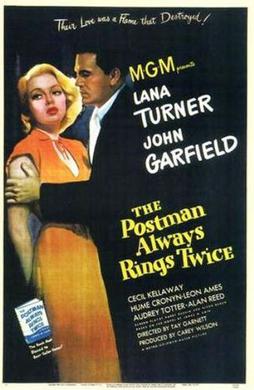It's one of the most memorable entrances in movies. Actually, her lipstick enters first, rolling across the floor toward him. She is Cora Smith and he is Frank Chambers, the man her husband has just hired to work in their roadside café/filling station. But more important, she is Lana Turner, one of the last of the products of the resources of the studio star factories: lighting, hair, makeup, wardrobe, and especially public relations. And he is John Garfield, one of the first of a new generation of Hollywood leading men, trained on the stage, and with an urban ethnicity about him: His vaguely presidential
nom de théâtre thinly disguises his birth name, Jacob Julius Garfinkle. The pairing shouldn't work: She's a goddess, not an actress, whom the publicists had turned into "the Sweater Girl" while claiming that she had been discovered at a drugstore soda fountain. He was the child of Ukrainian-born Jews and grew up on the Lower East Side, trained as a boxer and studied acting with various disciples of Stanislavsky. But the chemistry is there from the moment Frank picks up Cora's lipstick and the camera surveys her from toe to head: white shoes, tan legs, white shorts, tan midriff, white halter top, blond hair, white turban. She reaches out her hand for the lipstick, but he doesn't move, so she comes over and gets it. It's one of the many power plays that will take place between them. The rest is one of the great film noirs, from a studio that didn't usually make them, MGM. In fact, the studio head, Louis B. Mayer, hated it, which is always a good recommendation: He hated
Sunset Blvd. (Billy Wilder, 1950), too. (Mayer's tastes ran to Jeanette MacDonald-Nelson Eddy operettas and the
Andy Hardy series.) It's the only really memorable movie directed by Tay Garnett, so I suspect a lot of credit goes to the screenwriters, Niven Busch and Harry Ruskin, and to their source, James M. Cain's overheated novel. Cain also wrote the novels that were the basis of two other famous noirs:
Double Indemnity (Billy Wilder, 1944) and
Mildred Pierce (Michael Curtiz, 1945), so the screenwriters and the director had some powerful examples to follow.
















